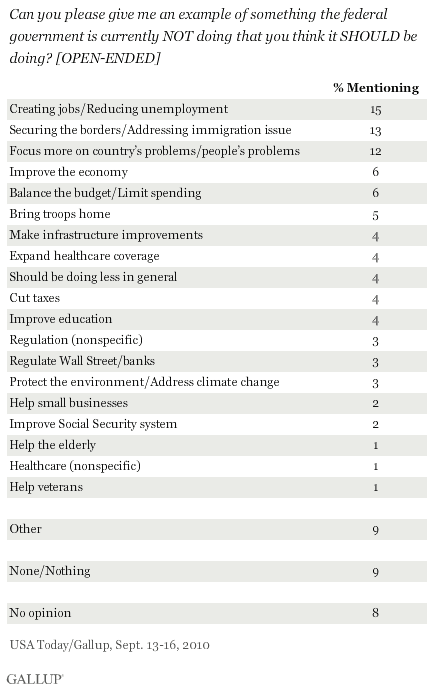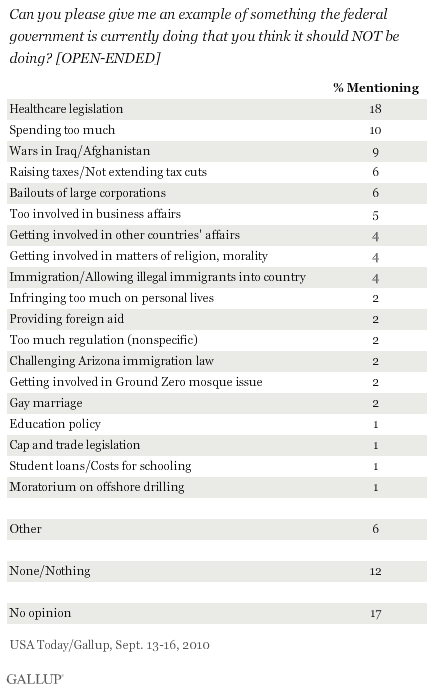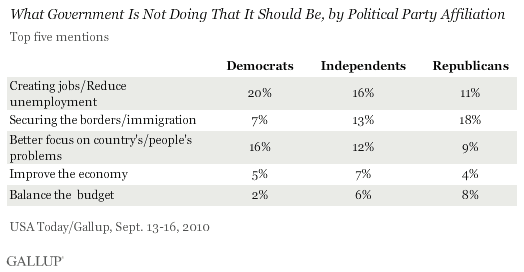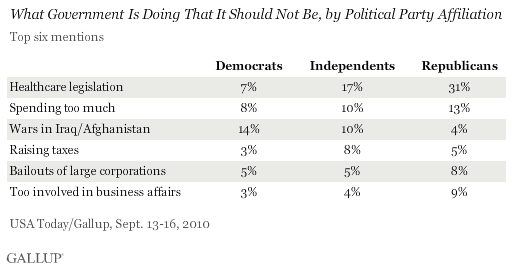PRINCETON, NJ -- Creating jobs and securing the country's borders are most top-of-mind when Americans are asked what the federal government is currently not doing that it should be doing. Americans are also likely to mention that government should focus more on the country's problems or the people's problems in general.

These results are based on a Sept. 13-16 USA Today/Gallup poll that explored Americans' views of government.
The vast majority of respondents, 83%, offer at least one specific issue or general direction in response to the open-ended question about what the government is not doing that it should be. Americans' responses focus mostly on specific domestic issues such as job creation, the economy, government spending, healthcare, taxes, and education. Relatively few mention international issues aside from immigration and bringing the U.S. troops home from Iraq and Afghanistan.
The poll also asked the reverse question -- what is the federal government currently doing that it should not be doing? Overall, Americans are somewhat less likely to offer a specific response on this question (71% do), with healthcare legislation most commonly mentioned, by 18%. The next-most-common issues or areas in which Americans would like to see the government pull back are government spending, the wars in Iraq and Afghanistan, tax increases, bailouts of large corporations, and being too involved in business affairs in general.

Americans' partisanship to a large degree influences their views of what they want the government to be doing or not doing.
For example, Republicans are much more likely than Democrats to believe the government should be active in securing the country's borders and in balancing the federal budget. Meanwhile, Democrats are more likely than Republicans to think the government should take action to create jobs and should focus more generally on the problems affecting the people and the country.

The one in three Republicans who mention healthcare legislation as something the government is doing but should not be helps make it the top response to that question. Healthcare ranks no better than third among Democrats, with the wars in Iraq and Afghanistan the area in which Democrats are most likely to say the government should not be involved.

Bottom Line
Gallup has documented that Americans view the government negatively from a broad perspective, but at the same time, they generally do not want the government to be very limited in its activity. Notably, even the vast majority of those who express a preference for very limited government still offer an opinion of something they think government should be doing that it is not.
To a significant degree, people's opinions about what government should or should not be doing are influenced by their political partisanship. This suggests that they are generally OK with government activity as long as those actions are consistent with their own point of view on how government should address certain issues.
Results for this USA Today/Gallup poll are based on telephone interviews conducted Sept. 13-16, 2010, with a random sample of 1,019 adults, aged 18 and older, living in the continental U.S., selected using random-digit-dial sampling.
For results based on the total sample of national adults, one can say with 95% confidence that the maximum margin of sampling error is ±4 percentage points.
Interviews are conducted with respondents on landline telephones (for respondents with a landline telephone) and cellular phones (for respondents who are cell phone-only). Each sample includes a minimum quota of 150 cell phone-only respondents and 850 landline respondents, with additional minimum quotas among landline respondents for gender within region. Landline respondents are chosen at random within each household on the basis of which member had the most recent birthday.
Samples are weighted by gender, age, race, education, region, and phone lines. Demographic weighting targets are based on the March 2009 Current Population Survey figures for the aged 18 and older non-institutionalized population living in continental U.S. telephone households. All reported margins of sampling error include the computed design effects for weighting and sample design.
In addition to sampling error, question wording and practical difficulties in conducting surveys can introduce error or bias into the findings of public opinion polls.
View methodology, full question results, and trend data.
For more details on Gallup's polling methodology, visit https://www.gallup.com/.
